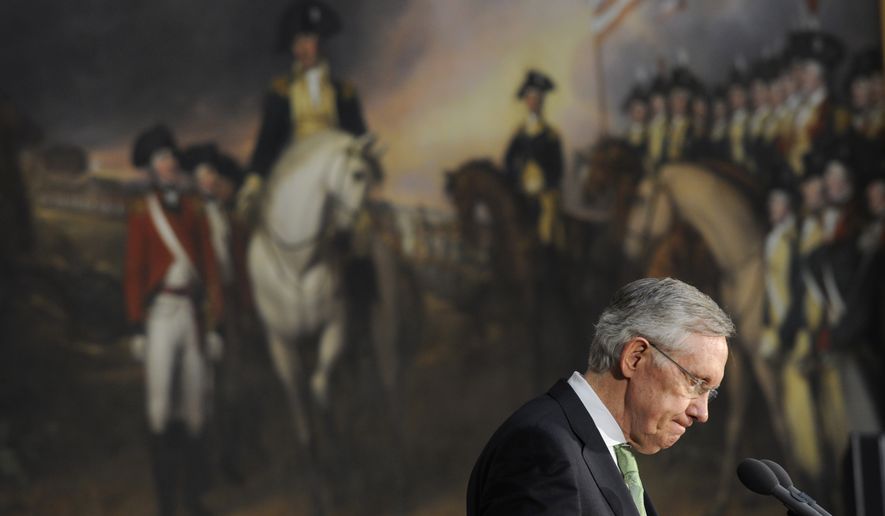Utah prosecutors on Tuesday filed criminal charges against two former state attorneys general in a court filing that makes tantalizing references to a possible pay-to-play influence scheme involving U.S. Senate Majority Leader Harry Reid.
Utah County District Attorney Sim Gill charged former Attorneys General John Swallow and Mark Shurtleff with numerous felony state crimes, including bribery, acceptance of illegal gifts, evidence tampering and a “pattern of unlawful activity.”
The charges were expected for months, and both men were taken into custody. Mr. Shurtleff served for many years as Utah’s top law enforcement official before retiring in 2013 and was succeeded by Mr. Swallow, who resigned in controversy after just a year. Both are Republicans.
“This is a sad day for Utah,” said Gov. Gary R. Herbert, who said that no matter what happens with the two men in court, it has become “a black eye for our state.”
Both Mr. Shurtleff and Mr. Swallow maintained their innocence, according to The Associated Press and other local news accounts.
While the charges are major news in Utah, it was the mention of two senators — Mr. Reid, Nevada Democrat, and Sen. Orrin G. Hatch, Utah Republican — that could reach Washington’s corridors of power.
PHOTOS: Celebrity mugshots: Stars behind bars
The documents detail efforts by a federally indicted Utah businessman, Jeremy Johnson, to secure meetings with Mr. Reid and Mr. Hatch, where Mr. Johnson hoped to enlist their help in fighting off an investigation by the Federal Trade Commission.
Prosecutors revealed one email where Mr. Swallow told Mr. Shurtleff that Mr. Johnson was seeking a meeting with Mr. Hatch about the FTC.
A spokesman for Mr. Hatch said that Mr. Shurtleff and Mr. Swallow duped the senator into taking a meeting with Mr. Johnson, but he never intervened with the FTC.
A month after that email, Mr. Swallow sent an email to Mr. Johnson saying he had spoken with another businessman, Richard Rawle, who held himself out as a go-between who could reach Mr. Reid “through a contact person.”
According to the court document, Mr. Swallow told Mr. Johnson “the price to obtain access to Rawle’s contact person likely ’won’t be cheap.’” Days later, in an Oct. 7, 2010, email message with the subject line of “Senator Reid,” Mr. Johnson wrote to Mr. Rawle asking about the connection.
“I talked with John Swallow, and he said you might have some connections to Reid that might be helpful to us,” Mr. Johnson wrote in the email to Mr. Rawle, citing his problems with the FTC.
SEE ALSO: Harry Reid declares border ‘secure’
The court records show Mr. Johnson subsequently wired money to an account controlled by Mr. Rawle totaling $250,000, and that Mr. Rawle subsequently sent payments of $8,500 and $15,000 to Mr. Swallow from that same account.
The court records make no further mention of whether a Reid meeting ever occurred.
However, Mr. Johnson has said that after he was indicted by federal authorities, he was told the money was supposed to be spent securing Mr. Reid’s help in the FTC issue.
Tuesday’s court records are the first to officially link Mr. Johnson’s efforts to get a meeting with Mr. Reid to the exchange of money.
Mr. Reid’s office has long dismissed the allegations as nonsense, and on Tuesday his spokesman refused to answer questions from The Washington Times about the indictments, saying the matters had already been covered in previous reporting by the paper.
Reid spokesman Adam Jentleson also refused to answer questions about his boss’s relationship with Mr. Rawle, including why the man would have claimed to be a go-between for Mr. Reid.
“I don’t work for Rawle. You will have to ask him,” Mr. Jentleson said.
Mr. Rawle, a Utah-based businessman, died in December 2012.
Previously, Mr. Jentleson acknowledged Mr. Johnson attended a fundraiser for Mr. Reid during his 2010 re-election campaign but said Mr. Reid doesn’t recall meeting the businessman.
“The record indicates that Mr. Johnson was present at this large group meeting, but Senator Reid does not recall him as anything other than a face in the crowd,” Mr. Jentleson said.
When Mr. Johnson’s accusations were first made public last year, Mr. Reid called him a man of “low record and character” and said his accounts were “absurd and utterly false.”
Mr. Jentleson in March told The Times that Mr. Johnson was “a desperate individual” facing dozens of federal charges.
“His allegations are false and the flailings of a desperate man,” Mr. Jentleson said.
A spokesman for Mr. Hatch, meanwhile, explained how the Utah senator was duped into taking a meeting with Mr. Johnson.
“Former Utah Attorney General Mark Shurtleff requested a meeting between Sen. Hatch and Jeremy Johnson to ostensibly discuss some humanitarian efforts with which Mr. Johnson had been involved,” said spokesman Matthew Harakal.
“Mr. Swallow accompanied Mr. Johnson to the meeting, and during the course of the meeting, Mr. Johnson told Senator Hatch that he thought he was being treated unfairly by the Federal Trade Commission.
“Sen. Hatch listened, suggested that Mr. Johnson follow the advice of his legal counsel, and never weighed in on Mr. Johnson’s behalf with the FTC or any other agency on this matter. In fact, Sen. Hatch never met with Mr. Johnson again,” said Mr. Harakal.
Mr. Gill, the local prosecutor in Salt Lake City, was one of two state prosecutors who told The Times back in March that they had stumbled onto possible incriminating information involving Mr. Reid and that his office was using FBI agents to assist in that investigation.
“We’re just two local prosecutors, but everybody who was supposed to look at this evidence above us has made a decision not to and, by default, left it to us to investigate and prosecute at the state level,” Mr. Gill said at the time.
• John Solomon can be reached at jsolomon1@washingtontimes.com.




Please read our comment policy before commenting.